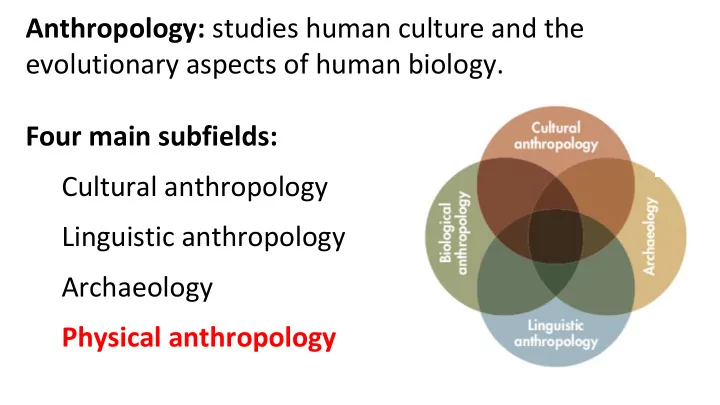

Anthropology: studies human culture and the evolutionary aspects of human biology. Four main subfields: Cultural anthropology Linguistic anthropology Archaeology Physical anthropology 1
The anthropological perspective Goals -Extend knowledge to include other cultures -Study: diverse human experiences "within the context of biological and behavioral continuity with other species" -Avoid ethnocentrism Ethnocentrism: viewing other cultures from the inherently biased perspective of one's own culture. 2
Science in practice 3
Reasoning in general Deduction: inferring from the general to the specific All dogs are mammals. Lassie is a dog. Therefore, Lassie is a mammal. Induction: inferring from the specific to the general On Earth, my pen falls downward. I am on Earth. Therefore, probably , gravity pulls pens downward. 4
Scientific thinking Science: a body of knowledge gained through observation and experimentation Science uses -Empirical data: gained from experiments or making more observations. -Quantitative data: measurable, numerical, quantities (mass, volume, length,...) 5
Scientific method Step 1: make observations: anything you experience with the five senses Step 2: form a hypothesis: a tentative explanation of our observations Step 3: Scientific testing: experiment and/or make more observations to confirm, disconfirm, or revise the hypothesis. -Replicate and repeat Step 4: Theory: a tested explanation of the facts. 6
Hypothesis testing Scientific hypotheses are falsifiable: possible to identify observations that disconfirm them. -Doesn't mean hypothesis is false, only that it's capable of being false. Easier: hypotheses should be testable: we're able to test and see if it passes or fails a test. 7
Ch. 2 Scientific thought and Darwin's theory of natural selection 8
9
Pre-scientific thinking Common views before the 18th century Fixity of species Young Earth 10
Pre-scientific thinking Changes before the 18th century -Discovery of the New World -New tools (telescope) -Heliocentrism 11
Precursors to evolutionary theory John Ray: Species : a group of organisms that are reproductively isolated Carolus Linnaeus: binomial nomenclature Homo sapiens = Genus species
Precursors to evolutionary theory Georges-Louis Buffon: Changes in the environment correlate with changes in an organism 13
Precursors to evolutionary theory Jean-Baptiste Lamarck: emphasized organism-environment interaction First attempt to explain evolution... Inheritance of acquired characteristics -Traits altered through use or disuse -Altered traits are inherited 14
Precursors to evolutionary theory Jean-Baptiste Lamarck: emphasized organism-environment interaction First attempt to explain evolution... Inheritance of acquired characteristics -Traits altered through use or disuse -Altered traits are inherited Problem: says traits are altered during the lifetime of an individual 15
Georges Cuvier: tried to explain geology with catastrophism -First to say species go extinct Charles Lyell: Uniformitarianism explains geology points to an old Earth https://youtu.be/o_wmulBtWlk 16
17
Thomas Malthus: populations grow exponentially but resources grow linearly -Leads to competition for resources 18
Charles Darwin (1809-1882) -Knew of Lamarck, Buffon, etc. -BFFs with Lyell -5-yr voyage around the world informed his theory of natural selection 19
Natural selection: artificial selection analogy Artificial selection -All dogs share a common ancestor -Explains the extreme variation between breeds 20
Natural selection in detail - Eight processes Individuals with favorable traits have higher reproductive success compared to individuals with less favorable traits. 1. All species produce offspring faster than the food supply. 2. There's biological variation in all species. 3. Each generation more offspring are born than survive. 21
Natural selection in detail - Eight processes 4. More favorable traits lead to more fit individuals. 5. Environment determines which traits are favorable. 6. Traits are inherited and passed on to yield greater reproductive success. 22
Natural selection in detail - Eight processes 7. Changes accumulate over time leading to new species. 8. Geographical isolation causes speciation via selective pressure. 23
Important terms for evolution by natural selection Reproductive success: # of reproductively viable offspring produced. Fitness: Relative measure of reproductive success. Selective pressures: Environmental factors determine reproductive success. 24
Recommend
More recommend